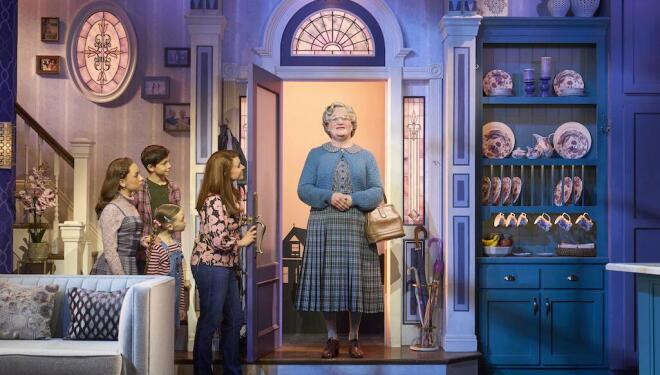
Usher is a 26-year-old Disney usher in the midst of both a quarter-life crisis and identity crisis. He’s in a dead-end job with mounting student loan debt, and his love life – sung about explicitly and sometimes shockingly – has been reduced to boundary-less hook-ups because of his low self-worth. His mum wants him to write a nice, clean gospel play of the Tyler Perry ilk, while his inner white girl leaves him feeling like a traitor to his race.

Nathan Armarkwei-Laryea (Thought 2), Yeukayi Ushe (Thought 3), Danny Bailey (Thought 5), Kyle Ramar Freeman (Usher), Eddie Elliott (Thought 6), Tendai Humphrey Sitima (Thought 4) and Sharlene Hector (Thought 1). Photo: Marc Brenner
Usher’s conflicting, self-sabotaging thoughts are playfully voiced by a six-strong, all-black chorus of ‘thoughts’, who include his Daily Self-Loathing and Supervisor of Sexual Ambivalence. Dressed in pastel-hued athleisure wear, they morph into everyone in Usher's life. In funny number We Wanna Know they come together to voice his prying mother, but with the tilt of a head and an altered voice and gait, they become industry big shots ripping apart his work, or the men he meets on dating apps. Twice we learn through acutely racist comments that while played by black actors, these potential partners are white, adding another layer of complexity to this show that keeps us guessing.
American import Kyle Ramar Freeman is excellent as Usher. A triple-threat performer with enviable stage ease, his warmth has us instantly on his side as he reels off his hardships: chiefly, trying to make it as a struggling writer who feels penalised for his race and sexuality.
What begins as surreal becomes a whole lot darker. In Tyler Perry Writes Real Life, historical figures come knocking on Usher’s subconscious, calling him a race traitor for his tastes and interests. Later, Usher supervises a parody of a gospel play in which racial stereotypes are eerily hammed up for effect. Then Arnulfo Maldonado’s initially simple set opens up like a doll's house to reveal a garish church with big, crass letters spelling out HIV surrounded by flames, plunging the spoof into nightmarish territory.

Danny Bailey (Thought 5), Nathan Armarkwei-Laryea (Thought 2), Sharlene Hector (Thought 1) and Tendai Humphrey Sitima (Thought 4). Photo: Marc Brenner
Usher’s strained relationship with his God-fearing parents, who see living in New York as a gay man as synonymous with catching Aids, becomes the main conflict of the show. We witness it fall apart and get patched up again, but there’s no Disney-style happy ending for the play-within-a-play. Instead, this layer of the show is left suspended in limbo as Jackson 'flouts every convention' to cleverly remind us Usher is only a character inside another character’s mind.
Fortunately, the playwright’s own story wraps up happily for now, for his musical about writing a musical has proved itself a triumph on both sides of the pond.
| What | A Strange Loop, Barbican Theatre review |
| Where | Barbican Theatre, Barbican Centre, Silk Street, London, E2CY 8DS | MAP |
| Nearest tube | Barbican (underground) |
| When |
17 Jun 23 – 09 Sep 23, 8:00 PM – 9:40 PM |
| Price | £24+ |
| Website | Click here for more information and to book |



